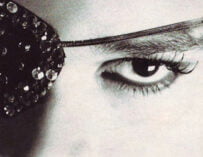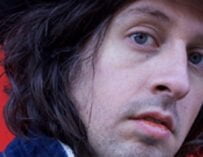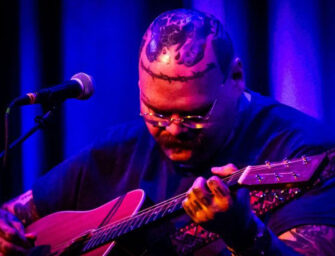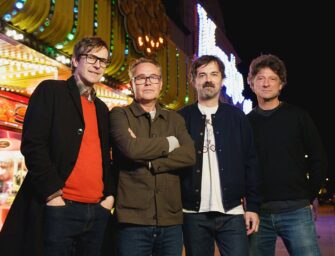
Carly Paoli: “When I write the lyrics I only find it possible if I can hear a melody.”
We chat to a classical singer whose alluring debut album features her own lyrics and a duet with José Carreras
Classical music might not be our forte, but we can spot a rising star when we see one. Such is the case with Carly Paoli whose debut album is currently riding high in the classical charts. Making the achievement even more impressive is the fact that Paoli contributed her own lyrics to the record, writing words to familiar melodies such as Cinema Paradiso and the theme to Legends Of The Fall.
Born in Mansfield but with Italian family, Paoli was able to combine her education at the Royal Northern College of Music with the experience of singing in the piazzas of Puglia as a teenager. Singing My Dreams was recorded at Abbey Road Studios and was largely arranged by Romano Musumarra; it’s an accessible entry point into the world of classical music for pop and theatre fans. We caught up with Carly shortly after the record’s release to discuss her lyric-writing process…
Is the success of the album extra special because you’ve written on some of the tracks?
“This is my debut album so the whole process is completely new to me and I didn’t know that I could write lyrics, I’d only ever really thought about singing. I’ve been classically trained since I was nine years old but it was only in the last three years that I tried to write a song. For me it took losing my grandma to inspire me to do something like that, to find another way to express myself.
“The first song that I ended up writing I was actually on a flight coming back from Italy and I’d just watched the movie Legends Of The Fall, which is one of my all-time favourites, and the reason I love the movie so much is because of the music of James Horner. When I write the lyrics I only find it possible if I can hear a melody. I don’t seem to be able to write without a melody in mind and that was the melody that I imagined these lyrics to and it was just incredible for me to bring that to life with my producer. The song is called Memory Of You and it features as the very last song on the album.”
Was it the same process for writing the lyrics to Se Tu Fossi (Cinema Paradiso)?
“Absolutely and it was all around the same time. It was a time when I had a lot of emotion and this just became a way of expanding that emotion and using it for something that was really useful for me. The recording of Cinema Paradiso is actually a live recording from The Roman Forum so that was a really special moment for me to be able to share my message. I feel that the lyrics do depict what the Italian is saying. I speak fluent Italian because my grandfather was Italian and it’s a place where I spent a lot of time growing up.
“To me it’s important that if you’re singing in another language that you can find something that makes it accessible and that you can really express the emotions that are in that song so other people can understand what you’re singing about. I think that’s what made the song Con Te Partirò successful, the moment they put in Time To Say Goodbye it changed it for the world.”
Do you go out and search for melodies or is it a more natural process?
“In the beginning it was in a natural way, completely, songs that I’ve just loved all my life. The song from Legends Of The Fall in particular, there was something about that melody that I could always hear lyrics with it. I suppose later in his life James Horner did write songs so there was an element of him that quite liked writing songs and I could just hear that theme with words. With Cinema Paradiso it was a song that I performed in the piazzas of Italy. I’d be there throughout the summers and I was very privileged that I could finish music college and then go out there and get all of this performance experience and that was one of the songs that I used to use as my calling card each time.”

Carly: “I wrote a special letter to James Horner’s family and I told them why I wrote the song.”
How similar are the messages in your lyrics to the Italian versions?
“My album is called Singing My Dreams and I find that the lyrics that I normally drive towards are lyrics that are talking about hope and dreams and sharing those dreams with the world in a special way. That’s the process which has been happening to me over the last three years. To be able to walk into a supermarket or HMV and actually pick up a hard copy of my album is something beyond anything I could have ever imagined. I think that it’s that feeling and the journey that I’ve had over the last three years in making this album that completely influenced my lyrics.”
After you’d started writing those songs were you determined to have them on the album?
“I was but I was quite naïve, you don’t just go and write lyrics to somebody’s song, so it was quite a delicate process afterwards. I wrote a special letter to James Horner’s family and I told them why I wrote the song and also sent the lyrics and it was a huge honour for me when I got their reply and received their blessing to have it on my album. That was extremely important for me.”
Was that similar with the Morricones?
“Exactly the same process. It was special because that song featured at such a unique event. The concert where it was performed live was held in the ancient Roman Forum and it’s something that will never happen again. The concert was held in honour of Pope Francis’ jubilee year, the Year of Mercy. It’s unique and a special piece of history for myself to treasure.”
How important was your relationship with your arranger when recording the album?
“I had a fantastic relationship with Romano [Musumarra] and he composed songs from scratch for my voice, he arranged songs for me and we’d go through things together. It was a real process. He’d send me back an idea and I’d say ‘no I really want to go up to this note here,’ or ‘can you change the key at this point,’ it was a really fun creative process. I’ve learned a lot about myself throughout the process of making this album, I probably wouldn’t have had the confidence to do that before but helped me to do that.”
Did you scrutinize each track in the same way or was there special attention to the songs that you’d written the lyrics for?
“I recorded Memory Of You two years ago and it then came to six months before releasing the album and I said ‘I’m not happy with this, I can’t hear my lyrics,’ so I went back into Abbey Road Studios and re-recorded the vocals to that song and a few others. As a singer something I really love and that inspired me as a young artist was the storytelling element, not just the classical sound and the drama of the high notes but I also loved what you can receive from the musical theatre world. They have this incredible ability to tell a story, or people like Barbara Streisand, in the way that they can colour each word in a special way and that’s something that I really wanted on this album. I wanted it to have that special feature, so I did record them again.”
Do you think the album is therefore more accessible for audiences from a theatrical or pop background?
“Yes, it is. It’s quite modern in the way we thought about the album. It’s not a traditional group of songs which you’d expect to hear. The fourth track is an Italian song called Almeno Tu Nell’Universo. It’s a pop song that I heard from being young, it was a 1980s pop song sung by a lady called Mia Martini and she’s got a vastly different voice to me, a real huskiness in the same way that Bonnie Tyler has, but the song now sounds like an operatic aria. It’s finding your own way to interpret a song and we’ve had a lot of fun doing that. There’s lots of songs I recorded that haven’t made it on to the album but that’s purely because I didn’t feel like they sat well within the theme of dreams.”

Carly Paoli: “Words with nice long vowels sounds are always the best.”
When you’re writing the lyrics is it your voice that you can hear singing them?
“I think it’s normally my own voice that I hear but actually I have recently collaborated on a song with an Italian pop singer. It was a song which he’d already recorded and made into a hit but then we did a unique version where the second version was sung by me in English so it sounded like a relationship, one from Italy and one from England. That was different because I was then writing for a male voice in an English language.”
You’ve also collaborated with your old singing teacher, that must have been quite incredible considering that you started working together when you were just nine?
“I think some people just come into your life and it was meant to happen. I was supposed to meet Liz Hetherington when I was nine. I went to the Royal Northern College of Music and I studied at Tring Park [School for the Performing Arts] to study musical theatre where I experienced other teachers but Liz was always the one that I came back to – I suppose because she knows me inside out. She’s a very creative and talented lady and together with her friend Dom Haslam she wrote one of the songs on the album called One Bright Star.”
You also worked together on your duet with José Carreras…
“Yes, they were lyrics that we came up with together. José and I decided to do En Aranjuez Con Tu Amor as a duet as it had never been made into one before. It’s the first recording that he has done in over 20 years so it was important to him. When we came to collaborate on the song it had to be arranged in a certain way and there was a section that gave us a chance to depict in English what the Spanish were saying and that was something we all worked on together. He was amazing and we recorded it in his home town of Barcelona, which was fantastic.”
Do you think you’ve learnt lessons about songwriting which you’ll take forward to your next project?
“It’s something I’d like to do a lot more of. I’ve only just released album one but I find myself listening to music all the time thinking ‘I’d really love to collaborate with this person one day and see if we can make something happen,’ but I still appreciate how much of a natural process this has been. Songs have sort of fallen into the album out of the performances we do. With the Pope event a song was born called A Time For Mercy to celebrate his Year of Mercy.
“I’ve also had amazing lyricists work on the album, such as Don Black who wrote the lyrics to the song After Loving You which just screams the themes of Bond and takes you back to songs that he wrote for Shirley Bassey. His son Grant Black wrote the lyrics to A Time For Mercy so I’ve got brilliant people around me that I’ve been able to learn a lot from.”
One final question… As a singer, when someone presents you with a lyric what are the things that jump off of the page and excite you?
“Some words sound like what they mean and you can really make special things happen with those descriptive words. Some words you try and avoid because they’re just very difficult to sing. ‘B’ and ‘P’ are normally ones to avoid at the beginning of words because they make a poppy sound on the microphone. Words with nice long vowels sounds are always the best. In the same sense, the English language is a good language to sing in because you have all these consonants that you can really bring to life.”
Interview: Duncan Haskell
Singing My Dreams is out now. For details of the album and Carly’s upcoming tour check out carlypaoli.com


































Related Articles